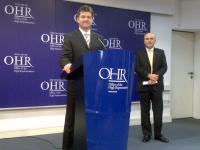 The new head of the Office of the High Representative, OHR, and EU Special Representative, Austria’s Valentin Inzko, officially took up his challenging position from the outgoing Miroslav Lajcak on Thursday.
The new head of the Office of the High Representative, OHR, and EU Special Representative, Austria’s Valentin Inzko, officially took up his challenging position from the outgoing Miroslav Lajcak on Thursday.
“I fully appreciate the responsibility and importance of this new role,” 59-year-old Inzko said at a joint press conference with Lajcak, a Slovak, on Thursday.
As Austria’s first ambassador to Bosnia and as a specialist in South-eastern Europe in the Austrian Foreign Ministry, Inzko is well versed in the issues facing Bosnia and the rest of the Balkans.
”Inzko is coming as a friend of Bosnia and Herzegovina and I am leaving as a friend of Bosnia and Herzegovina,” Lajcak said.
The handover ceremony took place at the end of the two-day meeting of representatives of the EU, the US, Russia and other countries gathered in the so-called Peace Implementation Council, PIC.
In addition to confirming Inzko’s appointment, the PIC conference extended the mandate of the Office of the High Representative, OHR, until at least late June.
The PIC will then meet again to assess the conditions required for the OHR’s closure and transition to a reinforced Office of the EU Special Representative, EUSR.
The PIC Communiqué issued after the meeting welcomed “the ongoing preparations for a tailor-made EU strategy and sustainability reinforced role in Bosnia and Herzegovina following the transition from the OHR to the EUSR.”
The last key condition that remains for the OHR’s closure is regulation of the issue of state property. The legalisation of the northern District of Brcko was finalised on Thursday, after Bosnia’s State Parliament completed adoption of the proper legislation in the second reading.
International officials who participated in the PIC conference on Wednesday and Thursday welcomed the breakthrough and supported the continuation of meetings of the so-called Prud group.
This is made up of leaders of the three main nationalist parties, Milorad Dodik of the [Serbian] Alliance of Social Democrats, Dragan Covic of the Croatian Democratic Union and Sulejman Tihic, of the [Bosniak, Muslim) Party of Democratic Action.
The three held a series of meetings over the past three months. Although the process halted in February because of escalating political tension, it has contributed to making headway in respect to several key reforms.
The PIC welcomed the breakthrough and the work of the Prud group and invited representatives of other parties to join the group.
“The only way for Bosnia and Herzegovina to move forward is through agreements and compromises,” Lajcak told the press conference.
The PIC communiqué also expressed serious concerns over the worsening political, economic and social situation in the country, over blocked and reversed reforms as well as with nationalist rhetoric and challenges to Bosnia’s constitution and the OHR’s mandate.
Inzko said that the main focus of his mandate would be to facilitate fulfillment of the remaining condition for the OHR’s closure.
“I will not hesitate to use my authority if the need arises,” he said, adding that the OHR’s broad governing powers would be used “only as the very last resort.”
 Eurasia Press & News
Eurasia Press & News


